Essay on Cultural Care and Communication in Palliative Care (PUBH7015)
VerifiedAdded on 2023/03/17
|7
|1483
|98
Essay
AI Summary
This essay delves into palliative and end-of-life care for Maori patients, emphasizing the significance of cultural care and effective communication. The introduction highlights the World Health Organization's definition of palliative care and its application to Maori individuals, emphasizing the need for holistic approaches, cultural sensitivity, and effective communication to alleviate suffering and address spiritual needs. The discussion explores the importance of cultural care in palliative settings, emphasizing its role in data collection, patient satisfaction, and improved communication. It also examines how communication facilitates the understanding of emotional, physical, and spiritual needs, leading to coordinated care and enhanced quality of life. The essay concludes by reiterating the importance of understanding the unique needs of Maori patients and the role of communication in delivering optimal palliative care. It recommends further research to improve nurses' understanding of patients' cultural needs.
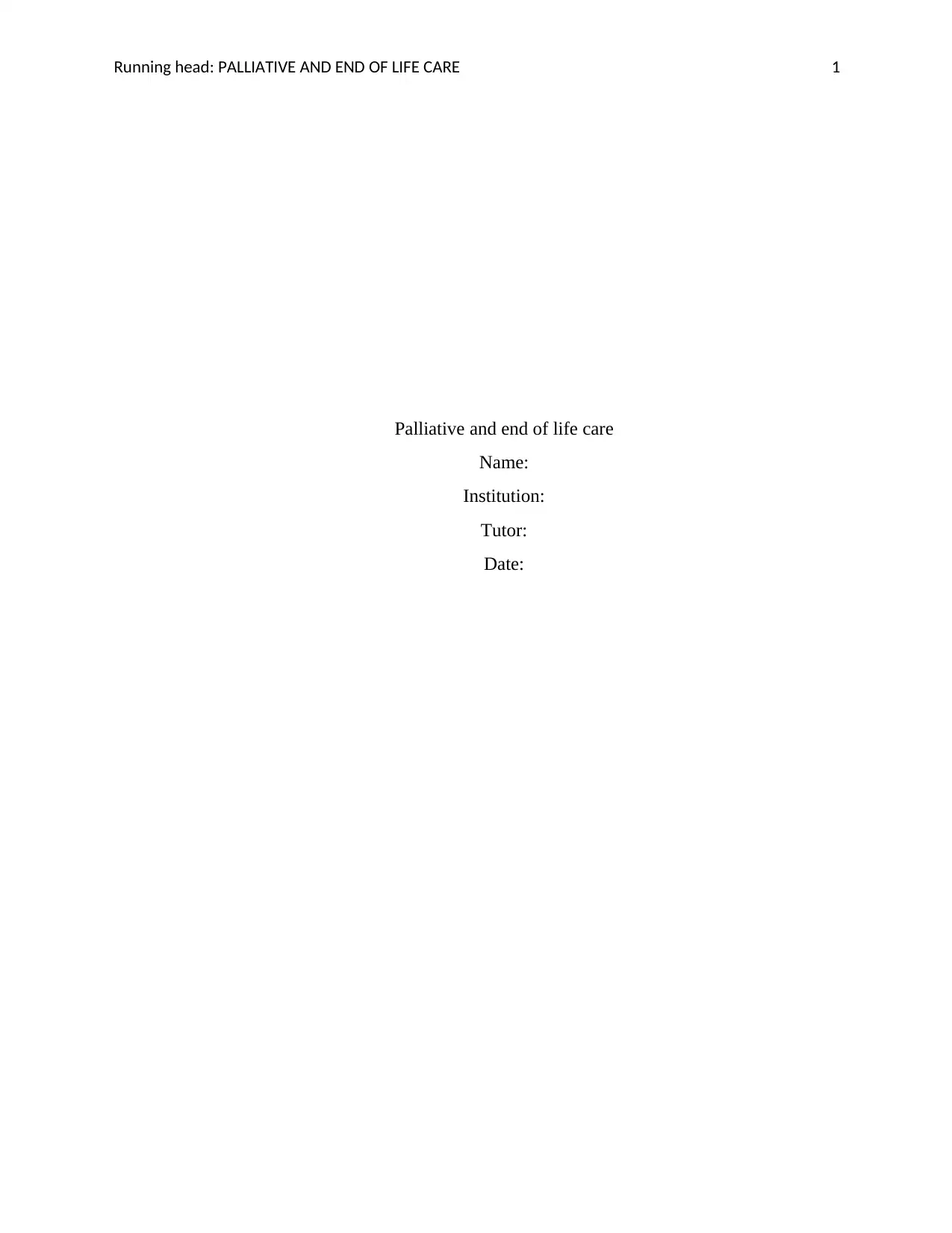
Running head: PALLIATIVE AND END OF LIFE CARE 1
Palliative and end of life care
Name:
Institution:
Tutor:
Date:
Palliative and end of life care
Name:
Institution:
Tutor:
Date:
Paraphrase This Document
Need a fresh take? Get an instant paraphrase of this document with our AI Paraphraser
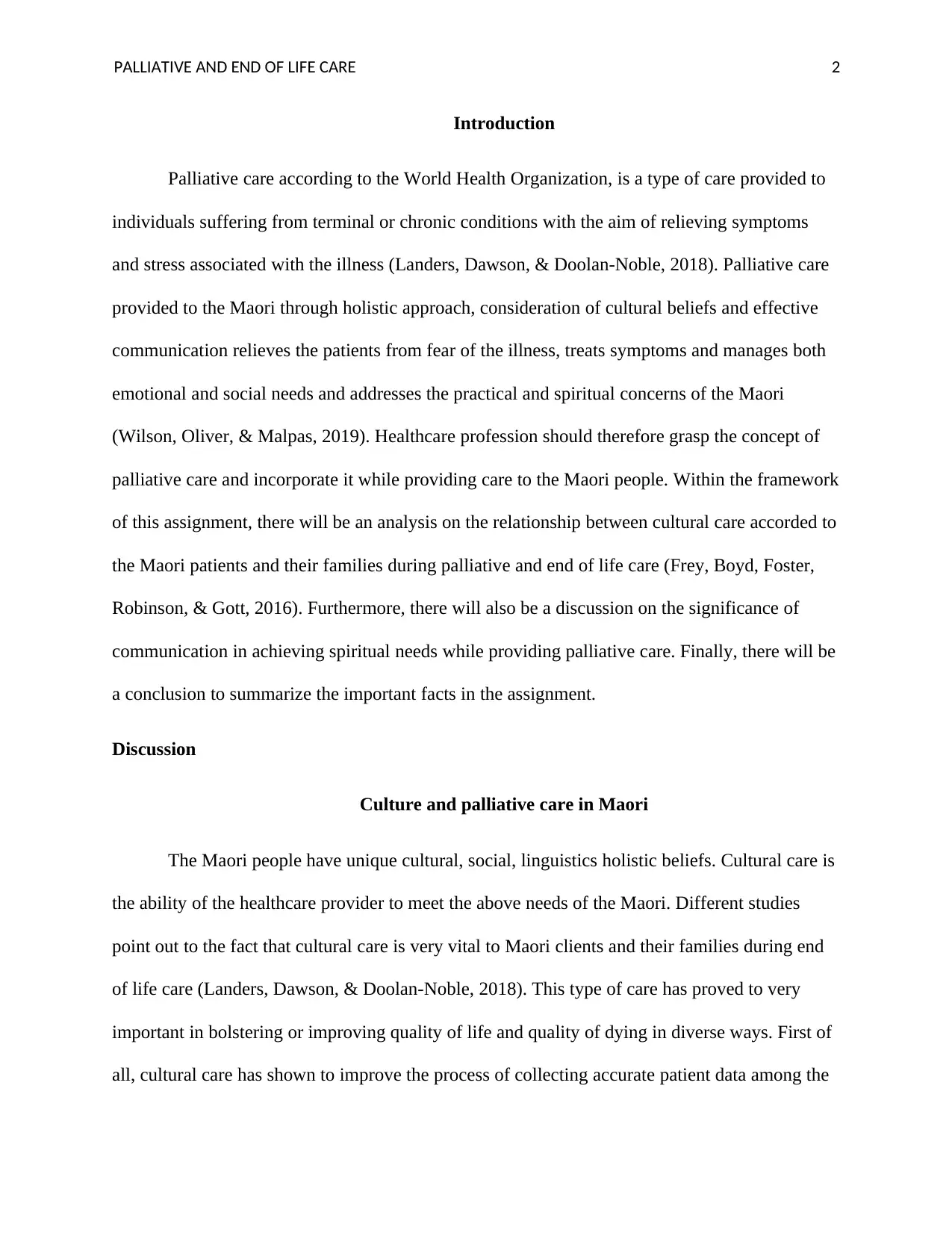
PALLIATIVE AND END OF LIFE CARE 2
Introduction
Palliative care according to the World Health Organization, is a type of care provided to
individuals suffering from terminal or chronic conditions with the aim of relieving symptoms
and stress associated with the illness (Landers, Dawson, & Doolan-Noble, 2018). Palliative care
provided to the Maori through holistic approach, consideration of cultural beliefs and effective
communication relieves the patients from fear of the illness, treats symptoms and manages both
emotional and social needs and addresses the practical and spiritual concerns of the Maori
(Wilson, Oliver, & Malpas, 2019). Healthcare profession should therefore grasp the concept of
palliative care and incorporate it while providing care to the Maori people. Within the framework
of this assignment, there will be an analysis on the relationship between cultural care accorded to
the Maori patients and their families during palliative and end of life care (Frey, Boyd, Foster,
Robinson, & Gott, 2016). Furthermore, there will also be a discussion on the significance of
communication in achieving spiritual needs while providing palliative care. Finally, there will be
a conclusion to summarize the important facts in the assignment.
Discussion
Culture and palliative care in Maori
The Maori people have unique cultural, social, linguistics holistic beliefs. Cultural care is
the ability of the healthcare provider to meet the above needs of the Maori. Different studies
point out to the fact that cultural care is very vital to Maori clients and their families during end
of life care (Landers, Dawson, & Doolan-Noble, 2018). This type of care has proved to very
important in bolstering or improving quality of life and quality of dying in diverse ways. First of
all, cultural care has shown to improve the process of collecting accurate patient data among the
Introduction
Palliative care according to the World Health Organization, is a type of care provided to
individuals suffering from terminal or chronic conditions with the aim of relieving symptoms
and stress associated with the illness (Landers, Dawson, & Doolan-Noble, 2018). Palliative care
provided to the Maori through holistic approach, consideration of cultural beliefs and effective
communication relieves the patients from fear of the illness, treats symptoms and manages both
emotional and social needs and addresses the practical and spiritual concerns of the Maori
(Wilson, Oliver, & Malpas, 2019). Healthcare profession should therefore grasp the concept of
palliative care and incorporate it while providing care to the Maori people. Within the framework
of this assignment, there will be an analysis on the relationship between cultural care accorded to
the Maori patients and their families during palliative and end of life care (Frey, Boyd, Foster,
Robinson, & Gott, 2016). Furthermore, there will also be a discussion on the significance of
communication in achieving spiritual needs while providing palliative care. Finally, there will be
a conclusion to summarize the important facts in the assignment.
Discussion
Culture and palliative care in Maori
The Maori people have unique cultural, social, linguistics holistic beliefs. Cultural care is
the ability of the healthcare provider to meet the above needs of the Maori. Different studies
point out to the fact that cultural care is very vital to Maori clients and their families during end
of life care (Landers, Dawson, & Doolan-Noble, 2018). This type of care has proved to very
important in bolstering or improving quality of life and quality of dying in diverse ways. First of
all, cultural care has shown to improve the process of collecting accurate patient data among the
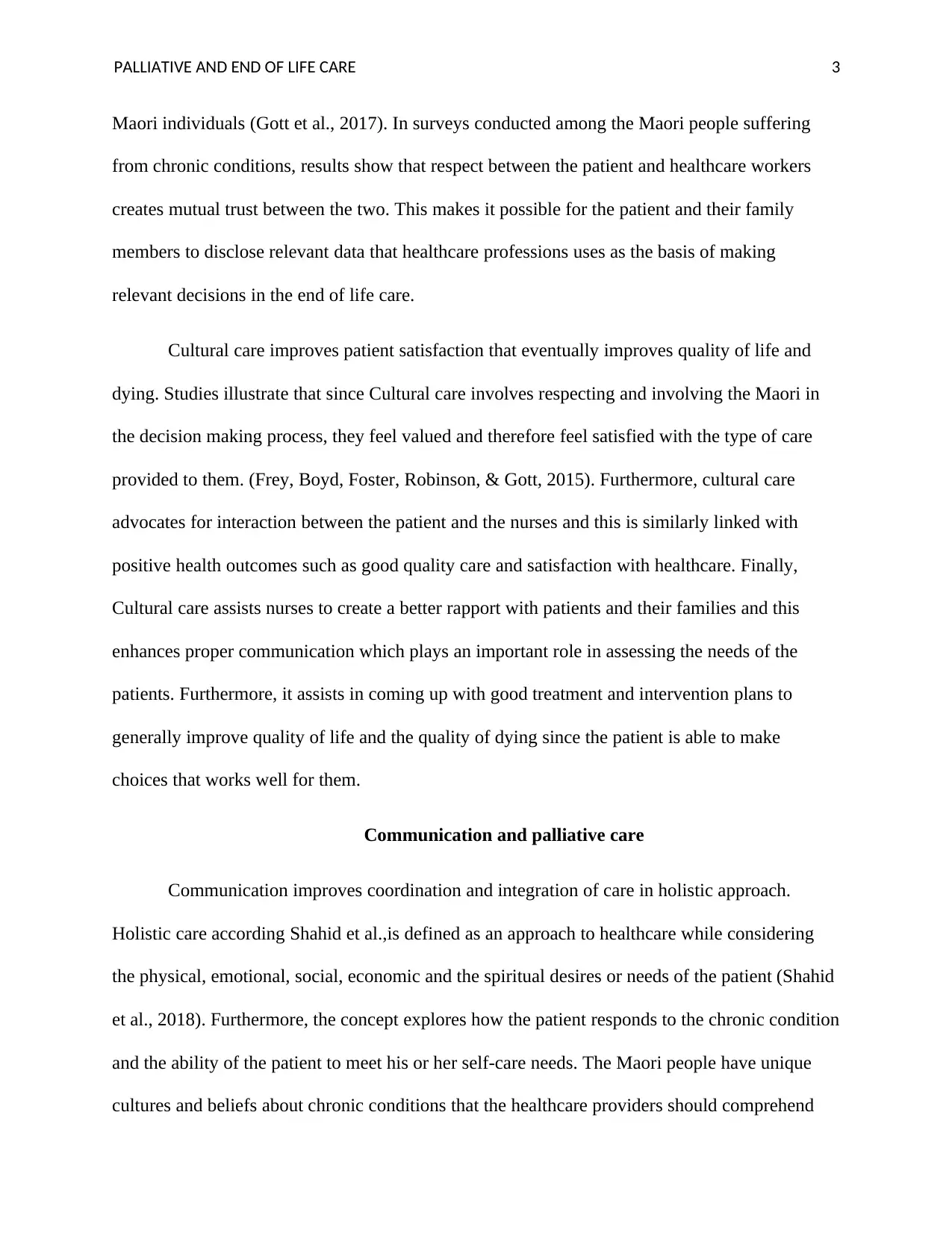
PALLIATIVE AND END OF LIFE CARE 3
Maori individuals (Gott et al., 2017). In surveys conducted among the Maori people suffering
from chronic conditions, results show that respect between the patient and healthcare workers
creates mutual trust between the two. This makes it possible for the patient and their family
members to disclose relevant data that healthcare professions uses as the basis of making
relevant decisions in the end of life care.
Cultural care improves patient satisfaction that eventually improves quality of life and
dying. Studies illustrate that since Cultural care involves respecting and involving the Maori in
the decision making process, they feel valued and therefore feel satisfied with the type of care
provided to them. (Frey, Boyd, Foster, Robinson, & Gott, 2015). Furthermore, cultural care
advocates for interaction between the patient and the nurses and this is similarly linked with
positive health outcomes such as good quality care and satisfaction with healthcare. Finally,
Cultural care assists nurses to create a better rapport with patients and their families and this
enhances proper communication which plays an important role in assessing the needs of the
patients. Furthermore, it assists in coming up with good treatment and intervention plans to
generally improve quality of life and the quality of dying since the patient is able to make
choices that works well for them.
Communication and palliative care
Communication improves coordination and integration of care in holistic approach.
Holistic care according Shahid et al.,is defined as an approach to healthcare while considering
the physical, emotional, social, economic and the spiritual desires or needs of the patient (Shahid
et al., 2018). Furthermore, the concept explores how the patient responds to the chronic condition
and the ability of the patient to meet his or her self-care needs. The Maori people have unique
cultures and beliefs about chronic conditions that the healthcare providers should comprehend
Maori individuals (Gott et al., 2017). In surveys conducted among the Maori people suffering
from chronic conditions, results show that respect between the patient and healthcare workers
creates mutual trust between the two. This makes it possible for the patient and their family
members to disclose relevant data that healthcare professions uses as the basis of making
relevant decisions in the end of life care.
Cultural care improves patient satisfaction that eventually improves quality of life and
dying. Studies illustrate that since Cultural care involves respecting and involving the Maori in
the decision making process, they feel valued and therefore feel satisfied with the type of care
provided to them. (Frey, Boyd, Foster, Robinson, & Gott, 2015). Furthermore, cultural care
advocates for interaction between the patient and the nurses and this is similarly linked with
positive health outcomes such as good quality care and satisfaction with healthcare. Finally,
Cultural care assists nurses to create a better rapport with patients and their families and this
enhances proper communication which plays an important role in assessing the needs of the
patients. Furthermore, it assists in coming up with good treatment and intervention plans to
generally improve quality of life and the quality of dying since the patient is able to make
choices that works well for them.
Communication and palliative care
Communication improves coordination and integration of care in holistic approach.
Holistic care according Shahid et al.,is defined as an approach to healthcare while considering
the physical, emotional, social, economic and the spiritual desires or needs of the patient (Shahid
et al., 2018). Furthermore, the concept explores how the patient responds to the chronic condition
and the ability of the patient to meet his or her self-care needs. The Maori people have unique
cultures and beliefs about chronic conditions that the healthcare providers should comprehend
⊘ This is a preview!⊘
Do you want full access?
Subscribe today to unlock all pages.

Trusted by 1+ million students worldwide
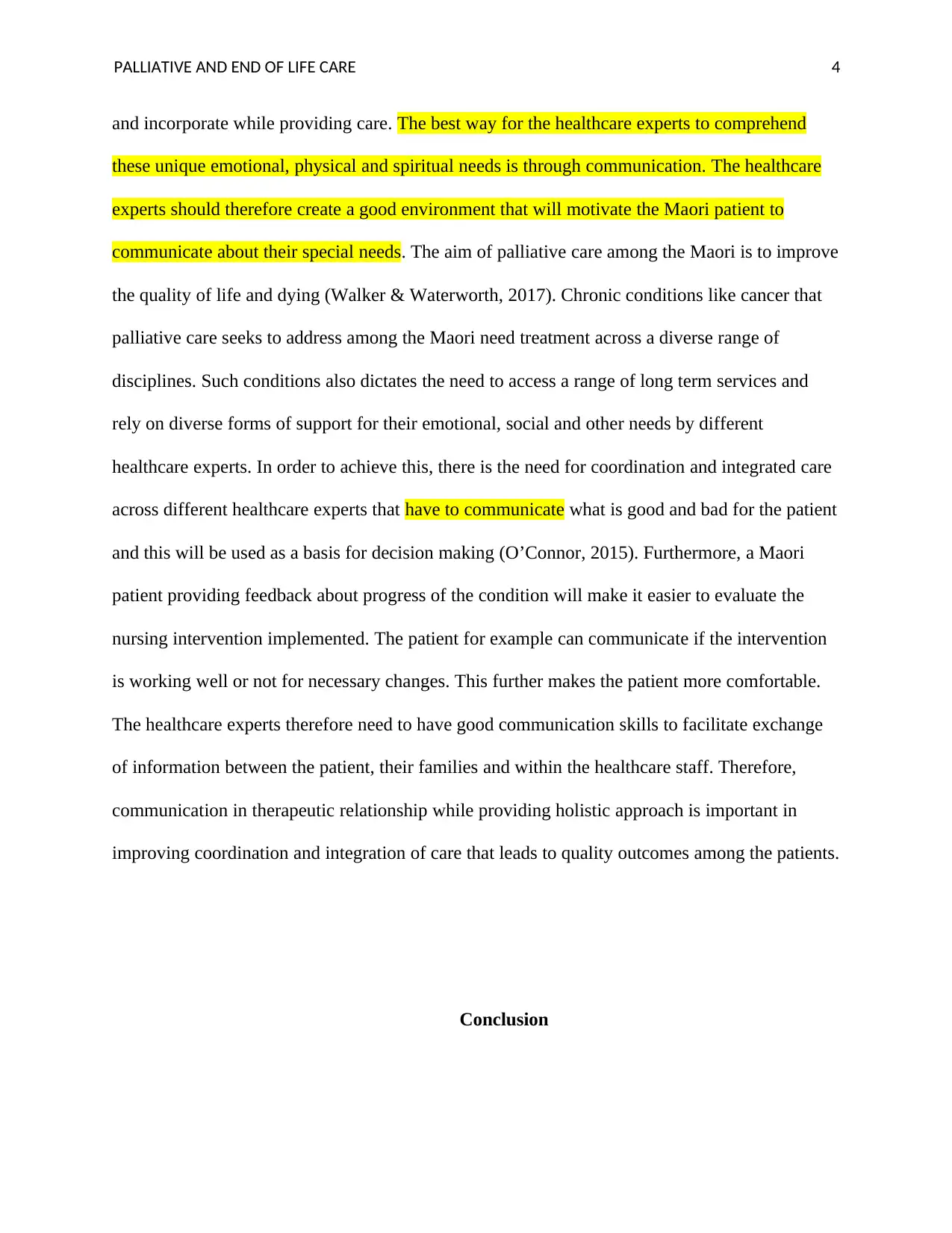
PALLIATIVE AND END OF LIFE CARE 4
and incorporate while providing care. The best way for the healthcare experts to comprehend
these unique emotional, physical and spiritual needs is through communication. The healthcare
experts should therefore create a good environment that will motivate the Maori patient to
communicate about their special needs. The aim of palliative care among the Maori is to improve
the quality of life and dying (Walker & Waterworth, 2017). Chronic conditions like cancer that
palliative care seeks to address among the Maori need treatment across a diverse range of
disciplines. Such conditions also dictates the need to access a range of long term services and
rely on diverse forms of support for their emotional, social and other needs by different
healthcare experts. In order to achieve this, there is the need for coordination and integrated care
across different healthcare experts that have to communicate what is good and bad for the patient
and this will be used as a basis for decision making (O’Connor, 2015). Furthermore, a Maori
patient providing feedback about progress of the condition will make it easier to evaluate the
nursing intervention implemented. The patient for example can communicate if the intervention
is working well or not for necessary changes. This further makes the patient more comfortable.
The healthcare experts therefore need to have good communication skills to facilitate exchange
of information between the patient, their families and within the healthcare staff. Therefore,
communication in therapeutic relationship while providing holistic approach is important in
improving coordination and integration of care that leads to quality outcomes among the patients.
Conclusion
and incorporate while providing care. The best way for the healthcare experts to comprehend
these unique emotional, physical and spiritual needs is through communication. The healthcare
experts should therefore create a good environment that will motivate the Maori patient to
communicate about their special needs. The aim of palliative care among the Maori is to improve
the quality of life and dying (Walker & Waterworth, 2017). Chronic conditions like cancer that
palliative care seeks to address among the Maori need treatment across a diverse range of
disciplines. Such conditions also dictates the need to access a range of long term services and
rely on diverse forms of support for their emotional, social and other needs by different
healthcare experts. In order to achieve this, there is the need for coordination and integrated care
across different healthcare experts that have to communicate what is good and bad for the patient
and this will be used as a basis for decision making (O’Connor, 2015). Furthermore, a Maori
patient providing feedback about progress of the condition will make it easier to evaluate the
nursing intervention implemented. The patient for example can communicate if the intervention
is working well or not for necessary changes. This further makes the patient more comfortable.
The healthcare experts therefore need to have good communication skills to facilitate exchange
of information between the patient, their families and within the healthcare staff. Therefore,
communication in therapeutic relationship while providing holistic approach is important in
improving coordination and integration of care that leads to quality outcomes among the patients.
Conclusion
Paraphrase This Document
Need a fresh take? Get an instant paraphrase of this document with our AI Paraphraser
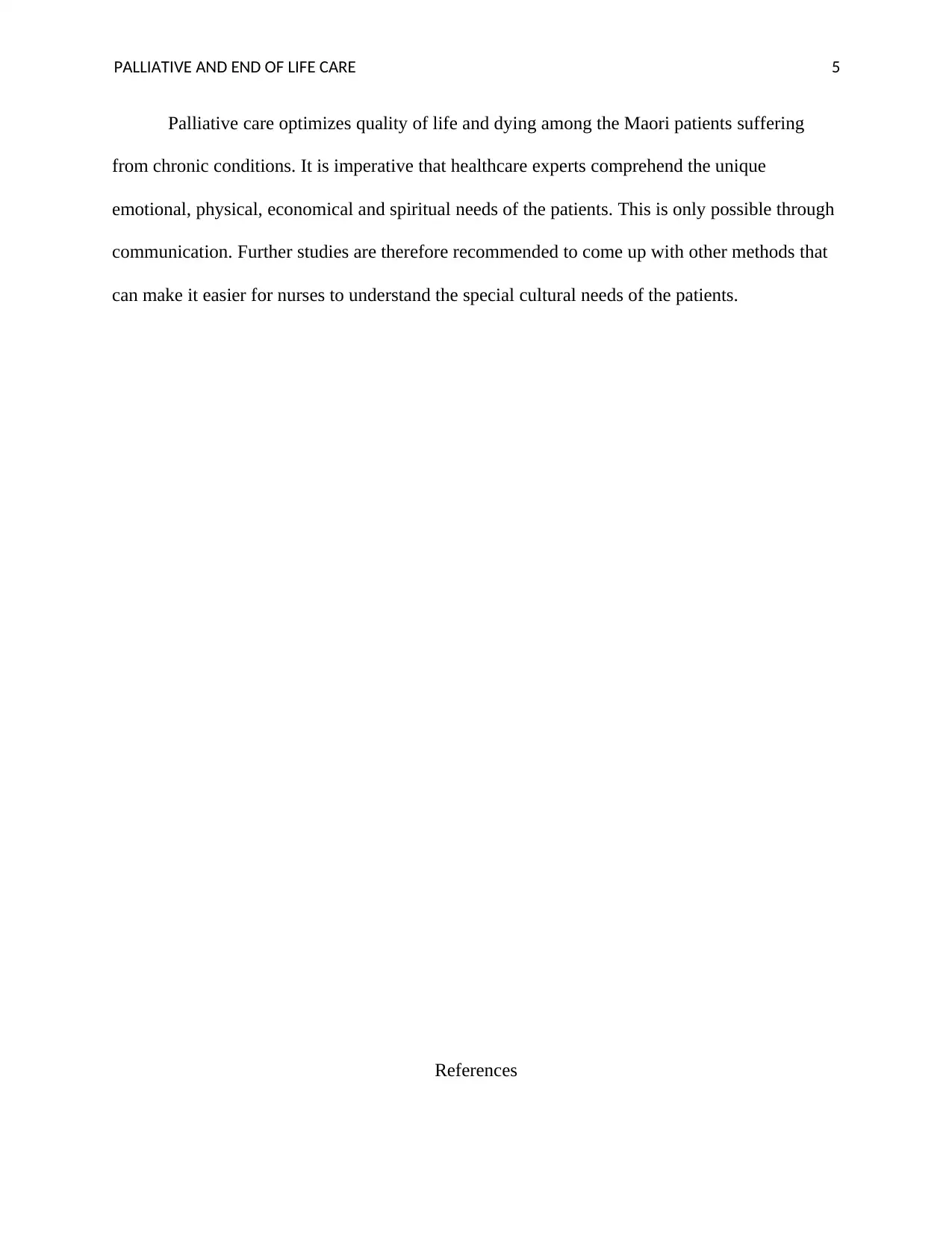
PALLIATIVE AND END OF LIFE CARE 5
Palliative care optimizes quality of life and dying among the Maori patients suffering
from chronic conditions. It is imperative that healthcare experts comprehend the unique
emotional, physical, economical and spiritual needs of the patients. This is only possible through
communication. Further studies are therefore recommended to come up with other methods that
can make it easier for nurses to understand the special cultural needs of the patients.
References
Palliative care optimizes quality of life and dying among the Maori patients suffering
from chronic conditions. It is imperative that healthcare experts comprehend the unique
emotional, physical, economical and spiritual needs of the patients. This is only possible through
communication. Further studies are therefore recommended to come up with other methods that
can make it easier for nurses to understand the special cultural needs of the patients.
References
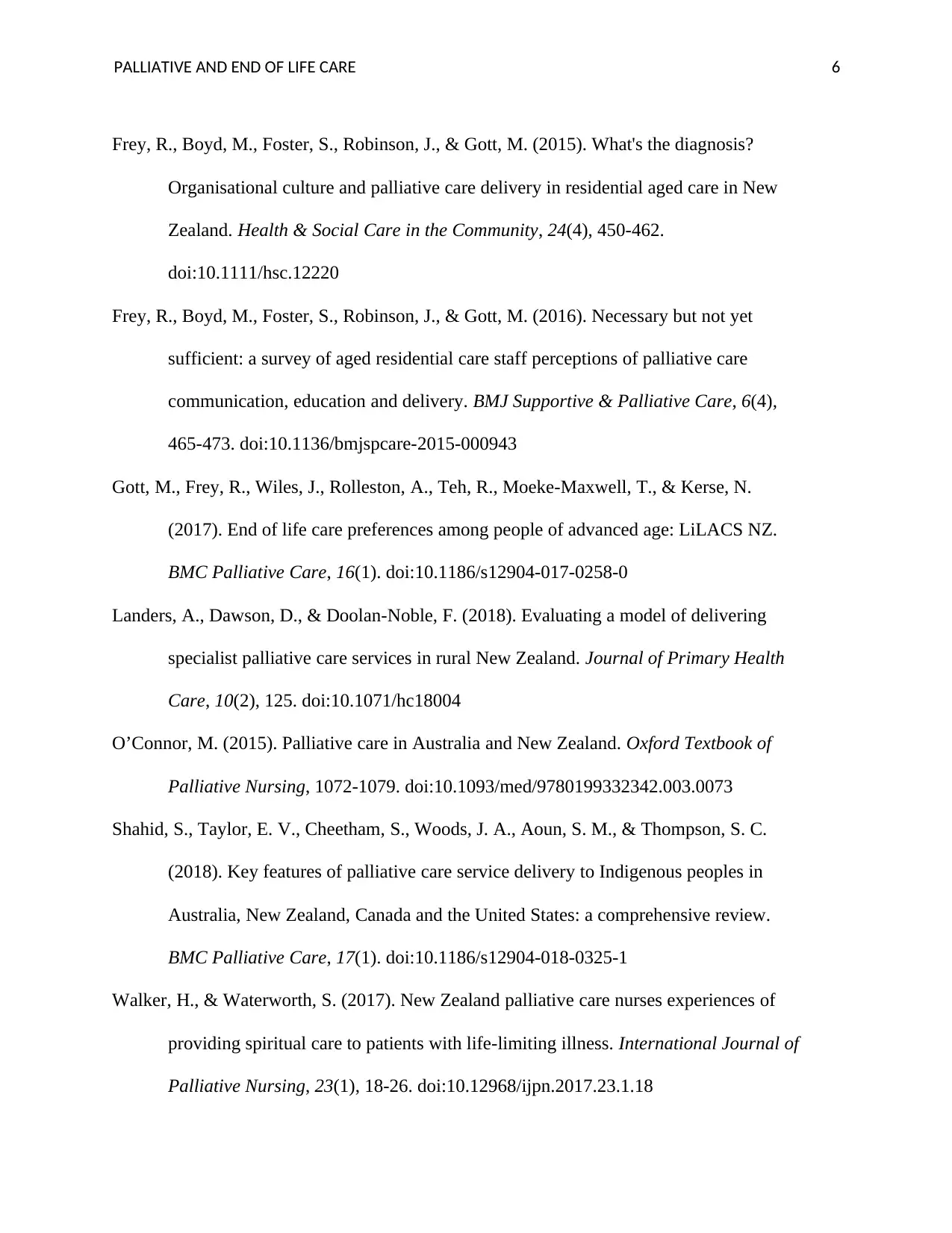
PALLIATIVE AND END OF LIFE CARE 6
Frey, R., Boyd, M., Foster, S., Robinson, J., & Gott, M. (2015). What's the diagnosis?
Organisational culture and palliative care delivery in residential aged care in New
Zealand. Health & Social Care in the Community, 24(4), 450-462.
doi:10.1111/hsc.12220
Frey, R., Boyd, M., Foster, S., Robinson, J., & Gott, M. (2016). Necessary but not yet
sufficient: a survey of aged residential care staff perceptions of palliative care
communication, education and delivery. BMJ Supportive & Palliative Care, 6(4),
465-473. doi:10.1136/bmjspcare-2015-000943
Gott, M., Frey, R., Wiles, J., Rolleston, A., Teh, R., Moeke-Maxwell, T., & Kerse, N.
(2017). End of life care preferences among people of advanced age: LiLACS NZ.
BMC Palliative Care, 16(1). doi:10.1186/s12904-017-0258-0
Landers, A., Dawson, D., & Doolan-Noble, F. (2018). Evaluating a model of delivering
specialist palliative care services in rural New Zealand. Journal of Primary Health
Care, 10(2), 125. doi:10.1071/hc18004
O’Connor, M. (2015). Palliative care in Australia and New Zealand. Oxford Textbook of
Palliative Nursing, 1072-1079. doi:10.1093/med/9780199332342.003.0073
Shahid, S., Taylor, E. V., Cheetham, S., Woods, J. A., Aoun, S. M., & Thompson, S. C.
(2018). Key features of palliative care service delivery to Indigenous peoples in
Australia, New Zealand, Canada and the United States: a comprehensive review.
BMC Palliative Care, 17(1). doi:10.1186/s12904-018-0325-1
Walker, H., & Waterworth, S. (2017). New Zealand palliative care nurses experiences of
providing spiritual care to patients with life-limiting illness. International Journal of
Palliative Nursing, 23(1), 18-26. doi:10.12968/ijpn.2017.23.1.18
Frey, R., Boyd, M., Foster, S., Robinson, J., & Gott, M. (2015). What's the diagnosis?
Organisational culture and palliative care delivery in residential aged care in New
Zealand. Health & Social Care in the Community, 24(4), 450-462.
doi:10.1111/hsc.12220
Frey, R., Boyd, M., Foster, S., Robinson, J., & Gott, M. (2016). Necessary but not yet
sufficient: a survey of aged residential care staff perceptions of palliative care
communication, education and delivery. BMJ Supportive & Palliative Care, 6(4),
465-473. doi:10.1136/bmjspcare-2015-000943
Gott, M., Frey, R., Wiles, J., Rolleston, A., Teh, R., Moeke-Maxwell, T., & Kerse, N.
(2017). End of life care preferences among people of advanced age: LiLACS NZ.
BMC Palliative Care, 16(1). doi:10.1186/s12904-017-0258-0
Landers, A., Dawson, D., & Doolan-Noble, F. (2018). Evaluating a model of delivering
specialist palliative care services in rural New Zealand. Journal of Primary Health
Care, 10(2), 125. doi:10.1071/hc18004
O’Connor, M. (2015). Palliative care in Australia and New Zealand. Oxford Textbook of
Palliative Nursing, 1072-1079. doi:10.1093/med/9780199332342.003.0073
Shahid, S., Taylor, E. V., Cheetham, S., Woods, J. A., Aoun, S. M., & Thompson, S. C.
(2018). Key features of palliative care service delivery to Indigenous peoples in
Australia, New Zealand, Canada and the United States: a comprehensive review.
BMC Palliative Care, 17(1). doi:10.1186/s12904-018-0325-1
Walker, H., & Waterworth, S. (2017). New Zealand palliative care nurses experiences of
providing spiritual care to patients with life-limiting illness. International Journal of
Palliative Nursing, 23(1), 18-26. doi:10.12968/ijpn.2017.23.1.18
⊘ This is a preview!⊘
Do you want full access?
Subscribe today to unlock all pages.

Trusted by 1+ million students worldwide

PALLIATIVE AND END OF LIFE CARE 7
Wilson, M., Oliver, P., & Malpas, P. (2019). Nurses’ views on legalising assisted dying in
New Zealand: A cross-sectional study. International Journal of Nursing Studies, 89,
116-124. doi:10.1016/j.ijnurstu.2018.03.012
Wilson, M., Oliver, P., & Malpas, P. (2019). Nurses’ views on legalising assisted dying in
New Zealand: A cross-sectional study. International Journal of Nursing Studies, 89,
116-124. doi:10.1016/j.ijnurstu.2018.03.012
1 out of 7
Related Documents
Your All-in-One AI-Powered Toolkit for Academic Success.
+13062052269
info@desklib.com
Available 24*7 on WhatsApp / Email
![[object Object]](/_next/static/media/star-bottom.7253800d.svg)
Unlock your academic potential
Copyright © 2020–2026 A2Z Services. All Rights Reserved. Developed and managed by ZUCOL.





